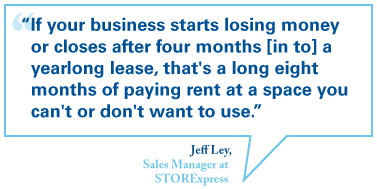Last Updated on March 8, 2024
Plenty of businesses run into the same problems of running out of space to operate. Storage.com is here to help provide solutions for growing businesses, whether through unique tips or additional space.
For small businesses and startups, finding an office space with enough room for your operations doesn’t always jibe with the budget you have. Rather than dive headfirst into an expensive or long-term lease for a space you’ll outgrow in a few months, consider housing your business at a self storage facility. With amenities like Wi-Fi, electrical outlets, and business centers, storage facilities can support your operations. Also, a storage unit is a much cheaper alternative to leasing an office space.
What Do Storage Facilities Provide to Help Businesses Operate Out of Units?
While a storage unit may sound like a less-than-desirable place to house your business, storage facilities that allow tenants to work from their units strive to make sure the spaces they offer are up to snuff.
!["Our whole preperty has Wi-Fi, which is, of course, free for any customers... [Some] customers have electrical lines dropped into [their] unit to plug in their computer or whatever equipment they might need."](https://blog.storage.com/wp-content/uploads/2014/09/smbusiness2.png)
“Our whole property has Wi-Fi, which is, of course, free for any customers…[Some] customers have electrical lines dropped into [their] unit to plug in their computer or for whatever equipment they might need.” Elmwood Self Storage also has a conference room with a projector available to business tenants, as well as 24-hour access to the facility.
Gardes says the facility prides itself on security, which is an important feature for tenants who run businesses out of units. There are gate codes around the facility, but Elmwood takes gated access security a step further by ensuring tenants only have access to the areas of the facility where their units are located.
“You park inside the building,” Gardes explains. “If you’re on the left side [of the facility], you can’t get to the right.” The elevator at Elmwood works the same way, only allowing tenants to their designated floors.
But it’s not just Elmwood’s business amenities and security that draws business tenants. They have networking opportunities as well. “We are a member of the local Chamber of Commerce, so once a month we have a networking event where [other members and businesses] can view the units and conference room,” Gardes says.
These networking events are great for Elmwood, but they also benefit business tenants who choose to work from their units by giving them an opportunity to meet other professionals in the area. For small businesses, storing at a facility with ties to the community is, as Gardes says, “a great way to get exposure,” which is why Elmwood continues to improve its events. This year’s Ultimate Business Card Exchange will be the facility’s biggest event yet and will take place Nov. 13, 2014.
STORExpress in Pittsburgh, Pa., is another facility that specializes in business storage. This unique facility combines traditional storage units with repurposed spaces in order to provide tenants with whatever they need. In fact, STORExpress has dedicated business units and offices that come fully-loaded with carpeting and air conditioning.
Sales Manager Jeff Ley says it was easy to “renovate [the space] for startups and small businesses.” There’s even furniture available to tenants who choose to run their businesses from STORExpress, though Ley says they’re welcome to bring their own.
If tenants want to rent a traditional unit (with climate control, of course) to save money, Ley says they can do that, too, since Wi-Fi is accessible across the STORExpress property. “It all depends on what the person is comfortable with,” he says. “Some people just don’t want to work in a raw storage space. The offices will work better for them.”
What If Storage Facilities Don’t Allow Businesses to Operate from Units?
Although self storage facilities with business amenities are on the rise, many still won’t allow tenants to work inside their units.
“We don’t allow [tenants] to run a business out of a unit,” says John Eisenbarth, Vice President of Operations at West Coast Self-Storage, who oversees 26 traditional self storage facilities in the Pacific Northwest.

Having a convenient storage facility location can make a big difference for small businesses that need to frequently drop off and pick up items stored away from home offices. Especially for those operating in “commuter corridors,” where Eisenbarth says West Coast Self-Storage sees the majority of their business rentals, being able to store items right down the street or within a mile or two of a home office can save time that would otherwise be wasted driving across town.
As for traditional storage facility features that small businesses might need, Eisenbarth says it comes down to the type of business. “Pharmaceutical reps obviously need a climate-controlled facility, [and businesses that work with] electronics are the same way,” he says. “It just depends on what the inventory is.”
Security is still a must for businesses using traditional storage, though. Whether you’re storing files, inventory, or equipment, storage security features help protect your livelihood. Keep an eye out for traditional facilities that have gated access (a fence around the facility with coded gate entry), video surveillance (cameras around the facility), or on-site management (a facility manager who remains on the premises during facility hours).
What Are the Benefits of Using Storage for Business?
Eisenbarth, Gardes, and Ley all believe self storage can help businesses tremendously, especially because of the month-to-month nature of storage rentals versus the long-term leases of office spaces.
“[Tenants] love the month-to-month,” Ley says. “If your business starts losing money or closes after four months [in to] a yearlong lease, that’s a long eight months of paying rent at a space you can’t or don’t want to use.”
Eisenbarth agrees, saying that having month-to-month payments for a storage unit can grow or shrink with your business. “It’s a huge benefit not to be locked into a long-term lease,” he says.

Facilities like STORExpress and Elmwood Self Storage even offer file and record storage in addition to commercial storage.
“We have a records division where we help everyone get their records organized,” Ley says of STORExpress, explaining that tenants essentially create a database that STORExpress then organizes and maintains.
“We can pull a file, deliver it for them—whatever they need,” Gardes says of Elmwood Self Storage.
Using self storage is an affordable option for small businesses and startups looking to dodge office leases with lofty fees. Even if you don’t need to work from the unit itself, storage can help with inventory management and record keeping. No matter what you need for your business, there’s a storage option in your area. A quick call to a facility operator or manager will get you started.
LEARN MORE ABOUT SELF STORAGE
FOR SMALL BUSINESSES TODAY!




